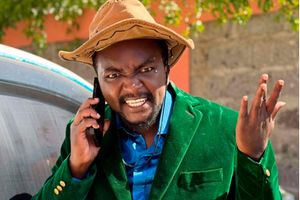
Manolo, real name Emmanuel Makau.
Before he became famous, Manolo (real name Emmanuel Makau) was already known in gospel circles as part of the group Recap. His journey took off in 2018, but it was his recent album that put him on the map.
How many songs did you sing before fame hit you?
Before fame? That’s an interesting question. Fame, to me, means being known within your niche, where if 100 people hear my name, at least 70 would recognise me. I was in a group called Recap before I went solo in 2018, and we had songs like “Five Stones”, “Tonight”, and “Worldwide”. We did a lot of groundwork performing in high schools. So, when I went solo, I already had some recognition in gospel circles. My first single, “One by One”, came out in 2018, produced by Majic Mike. But it’s really my recent album, Karibu, that has put me back on the map, with people now saying, “Hey, weren’t you in Recap?”
Are you able to live comfortably from your art, or do you balance other jobs too?
Music is a journey. As a creative career, you build your name and brand until you reach a tipping point, or a breakthrough where you start earning consistently. I’m still on that journey. Before hitting that breakthrough point, I had to keep investing and supplement with other businesses. God has been faithful, though. Income comes from events, digital platforms, distribution, and royalties. Your lifestyle and time management influence whether you need to supplement with other jobs. At some point, I decided to focus on my music career, exclusively.
How has your relationship with fellow artistes been? Do you feel support in the industry?
My relationship with fellow artistes has been great. You can’t know everyone, but I’ve had support from those I do know. Starting out, Kelele Takatifu and Moji Short Baba really helped us, and I appreciate them. Also, Majic Mike was instrumental, constantly calling me to the studio during a low point in my career. His support meant a lot. The few creatives in my circle have been a source of encouragement, and we have a good relationship.
What keeps you awake at night as a gospel rapper?
The impact of my music. It’s not just about entertaining; I ask myself, “Am I making a difference in people’s lives?” I also wonder, what’s my goal? Some artistes focus on millions of views or money, but I keep asking myself who my music is for and whether it aligns with how I live.
Tell us your songwriting process
I start most of my songs from the chorus. Inspiration often comes during church praise and worship or when I’m playing guitar at home, spending time with God. Sometimes, I collaborate with the producer, who might already have a beat, and I add lyrics to match the sound. My songs are mostly inspired by my relationship with God, focusing on the vertical conversation between man and God. For example, “I’m on My Way” was inspired by the prodigal son’s journey, which I related to personally.
Do you think you have to be naturally gifted to succeed in music, or can anyone do it with enough hard work?
Hard work can get you there. Some of the best musicians weren’t born with a singing talent, but worked hard to develop their skill. For example, Charisma wasn’t singing when I first met him, but through hard work, he improved and is now performing. Singing is like building muscles—you can train and improve through practice and technique.
Your relationship stayed under wraps until the wedding. Why did you choose to keep it locked?
My relationship with Achieng, my wife, was kept private because it’s our personal life. In today’s world, many people use their relationships to create content and gain an edge, but I didn’t want that. I wanted my wife to have a life outside of being associated with Manolo. I also didn’t want to expose her to the battles I may face due to being in the public eye, especially in the gospel music industry. I wanted to protect her from unnecessary attention and hardships.
We haven’t seen many of your live performances being shot as music videos. What’s the story behind that, and can we expect to see live events?
Yes, there’s been a rise in live (gospel) performances being recorded as music videos, especially in Kenya and East Africa. The challenge is that I don’t always have control over the sound or visuals at live events. Sometimes, I’m booked at venues where I don’t have full control over the technical aspects. I can only control the 30 minutes I’m given, the band, and the setlist. However, I’m open to releasing live performances when everything aligns, and I’m in control of the quality.
"Dunda" was released in December. What inspired this track, and how does it differ from the songs on your album ‘Karibu’?
"Dunda" is a love song, which is different from the God-centered theme of Karibu. I wrote it with my wife in mind, wanting her to hear it on our wedding day. It was a surprise for her. Writing it was a challenge because I wanted to express love in a way that honoured God, and I prayed for guidance. The line "God is love" became central, and the inspiration also came from the verse "He who finds a wife, finds a good thing."
How did you meet your wife, and how has she influenced your music journey?
I met my wife at her brother's wedding. I had seen her before, but it was through her brother, who I used to go to church with, that I met her properly. As for how she’s impacted my music, she’s been my biggest supporter. For creatives, you need someone who believes in you when you doubt yourself. My wife is that person for me. She’s my biggest fan and always encourages me, especially when I go through creative slumps. She tells me to keep going and reminds me of the value in what I do.
Bling is often a symbol of success in the music culture. Is jewellery your thing, or do you have other indulgences?
I wear a chain, occasionally, but as I’ve grown in my faith, I’ve come to value material possessions less. Cars, on the other hand, are something I’ve always loved, though my interest in them has faded over time. At this point, I focus less on things that impress others, as living that way can lead to an unhealthy relationship with money, where you spend just to show off.
What's the most challenging part about maintaining your creativity in such a competitive industry?
Staying original and true to myself. In this industry, trends come and go—like last year's Kompa style, Savara's "Halo Halo", and now the search for the next big thing. If you keep hopping onto trends, you'll find yourself lost, with an album full of different styles like Kompa, drill, and amapiano, just trying to keep up. For me, staying original means staying connected to the source—asking God what He wants people to hear. That’s why I believe some of my songs stand out, as they feel like they're pioneering something fresh. The challenge lies in balancing that originality with the pressure to meet audience expectations.
There's also pressure to cater to different audiences—older, more mature ones prefer mellow, worship songs, while younger audiences may lean toward rap. But ultimately, you're not just creating for yourself.
What's one piece of advice you'd give to an aspiring artiste looking to make it in this industry?
Check your motive. Be true to your purpose, but make sure it's meaningful. Music can be a tough way to make money. If that's your only goal, maybe choose an easier path. If you're in it for fame, there are quicker ways with platforms like TikTok. But if you're doing it for something bigger, like impact and the love of the art, then go for it.





